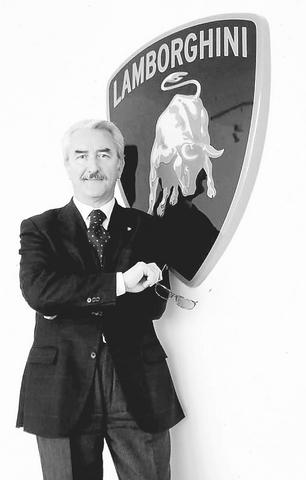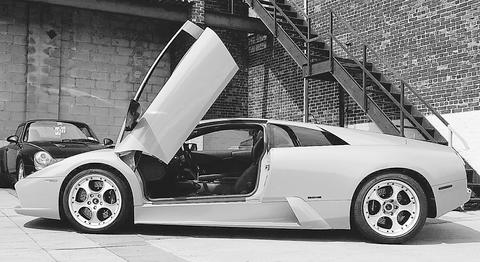There's not a lot of room for luggage in the front trunk of a midengine Lamborghini Murcielago, possibly not enough for US$273,000 in cash, which is what the car costs, plus US$15,000 in gas-guzzler and luxury taxes. But this extreme streamliner with its 575HP engine and race-car soundtrack is a veritable freight train when it comes to hauling psychological baggage.
New Yorkers either loved me or hated me when I pulled up in this intergalactic Italian groundship. I have to admit I had a few mixed feelings about myself, as well.
In times of terrorism and world tension, how relevant is an electric-yellow, 320kph, all-wheel-drive doorstop like the Murcielago (pronounced mur-SEE-a-lago)? Hard to say. A steady procession of pedestrians approached the car, either to pay tribute to my racy good taste or to snigger openly about whatever physical or emotional inadequacies would compel a middle-aged man -- namely me -- to choose such a conspicuous form of transport.

PHOTO: NY TIMES
This is the price you pay for driving a fantasy machine that dazzles onlookers with its shape and sound. With doors that scissor upward rather than open outward, and huge electrically controlled air scoops that silently emerge from the pronounced haunches, the Murcielago announces its owner's wealth, and ego, with an atomic bullhorn.
Surprisingly for something so low -- the roof is just 44 inches from the pavement -- this is a pretty easy exotic car to drive around town. It doesn't overheat. It is hard to stall. You can raise the body a bit to traverse bumps and avert driveway scrapes.
Founded in Sant'Agata, Italy, in 1963 by an industrialist, Ferruccio Lamborghini, to do battle with the road cars of Enzo Ferrari, the company has been financially troubled for much of its existence, and has defied the attempts of many owners to set the ship right. Uncertain demand for exotic automobiles, labor turmoil and the cars themselves -- plagued by finicky electrical systems, complex mechanicals and supernatural tendencies to rust -- made Lamborghini an evolving encyclopedia of all that was wrong with the business of Italian handbuilt cars.

PHOTO: NY TIMES
After the Volkswagen Group bought Lamborghini in 1998 (and put it under the wing of Audi) came the grim task of turning the tiny company around. The results -- seen for the first time on the 2002 Murcielago -- could have been predicted by students of the cool, efficient VW operation. Rough edges have been smoothed, function has been enhanced and a little emotion has been lost. But not too much.
Cool running
My test car's electrical components and air-conditioning functioned flawlessly in downtown traffic. The switches looked as though they had come straight from the VW-Audi parts bin, perhaps the best mass-market parts bin there is.
Despite the German meddling, the irrepressible spirit of an Italian hot-rod somehow survives, thanks in large measure to the intoxicating ways of the high-revving, free-breathing V12 engine, situated directly behind the two manually adjusted seats. It is the most potent power plant Lamborghini has ever put in a street machine.
The sense of Teutonic precision overlaid on raw Italian emotion carries over to the Murcielago's finely fettled if still outrageously extroverted design. You can see out of the mail-slot rear window, in contrast to some of the car's predecessors, though you still have no idea where the front ends, so sharply does it slope away from your field of vision. The precise location of the nether reaches is a similar mystery to the driver, so claiming a space on city streets is a high-risk endeavor, even for a Olympian parallel-parker like myself. Happily, the steering is light and the clutch operation is unexpectedly delicate, making it simple to take advantage of the six forward gears.
Practically speaking, three grocery bags in the nose is the cargo limit if the passenger seat is filled, but those groceries would make it home in a hurry. Violent acceleration is available on demand.
The Murcielago may be the diametric opposite of an SUV, but it, too, has all-wheel drive. Together with electronic traction control, it helps put a corrupting amount of absolute power to the ground with a minimum of antisocial wheel spin.
Speed
The Murcielago is one of the fastest production cars ever, reaching 97kph from a stop in 3.6 seconds. Yet the Lamborghini can dawdle around town, calling no attention to itself other than that which comes naturally to a machine that is radically shaped and radioactively yellow.
Fuel economy is not a talking point for Lamborghini salesmen; the car slurps a gallon of premium every 19km, and more in town. In other words, it gets even more appalling mileage than a Land Cruiser or a Suburban in a package that is even more frivolous and unnecessary.
New Yorkers are clearly divided about automotive frivolity, and they urgently want to share their views. People assume that a fellow extracting himself through the upraised door of an exotic car that pops and fizzes as it rolls up at hip level wants to hear -- nay, deserves to hear -- from them.
Two proximate encounters typified the currents of thought. A too-cool-for-school hipster crowd laughed and pointed derisively as I pulled up to the Mercury Lounge on the Lower East Side of Manhattan. A block away, workers from Katz's Delicatessen, out on a cigarette break, gave me a round of applause.
Women seemed less appreciative than men. While crossing at a light in TriBeCa, some black-clad ladies made it clear that they do not do like Lamborghinis. This is a paradox of the Murcielago experience: Young dudes think it will get them dates, but it turns out that the demographic group most attracted by the car are other young men who think it will get them dates.
As befits a machine so lacking in subtlety, Lamborghinis have long taken their names from the realm of bullfighting. While Murcielago means bat in Spanish, it was also the name of a 19th-century fighting bull whose life was spared in honor of his indefatigable courage and spirit.
Murcielago owners must not themselves lack courage or spirit; they will need both qualities to drive their cars in public. A self-selecting bunch, those who need 575HP and have 300 grand burning holes in their pockets need not look anywhere else.

Mercuries Life Insurance Co (三商美邦人壽) shares surged to a seven-month high this week after local media reported that E.Sun Financial Holding Co (玉山金控) had outbid CTBC Financial Holding Co (中信金控) in the financially strained insurer’s ongoing sale process. Shares of the mid-sized life insurer climbed 5.8 percent this week to NT$6.72, extending a nearly 18 percent rally over the past month, as investors bet on the likelihood of an impending takeover. The final round of bidding closed on Thursday, marking a critical step in the 32-year-old insurer’s search for a buyer after years of struggling to meet capital adequacy requirements. Local media reports

AI BOOST: Although Taiwan’s reliance on Chinese rare earth elements is limited, it could face indirect impacts from supply issues and price volatility, an economist said DBS Bank Ltd (星展銀行) has sharply raised its forecast for Taiwan’s economic growth this year to 5.6 percent, citing stronger-than-expected exports and investment linked to artificial intelligence (AI), as it said that the current momentum could peak soon. The acceleration of the global AI race has fueled a surge in Taiwan’s AI-related capital spending and exports of information and communications technology (ICT) products, which have been key drivers of growth this year. “We have revised our GDP forecast for Taiwan upward to 5.6 percent from 4 percent, an upgrade that mainly reflects stronger-than-expected AI-related exports and investment in the third

TECHNOLOGICAL RIVALRY: The artificial intelligence chip competition among multiple players would likely intensify over the next two years, a Quanta official said Quanta Computer Inc (廣達), which makes servers and laptops on a contract basis, yesterday said its shipments of artificial intelligence (AI) servers powered by Nvidia Corp’s GB300 chips have increased steadily since last month, should surpass those of the GB200 models this quarter. The production of GB300 servers has gone much more smoothly than that of the GB200, with shipments projected to increase sharply next month, Quanta executive vice president Mike Yang (楊麒令) said on the sidelines of a technology forum in Taipei. While orders for GB200 servers gradually decrease, the production transition between the two server models has been

US sports leagues rushed to get in on the multi-billion US dollar bonanza of legalized betting, but the arrest of an National Basketball Association (NBA) coach and player in two sprawling US federal investigations show the potential cost of partnering with the gambling industry. Portland Trail Blazers coach Chauncey Billups, a former Detroit Pistons star and an NBA Hall of Famer, was arrested for his alleged role in rigged illegal poker games that prosecutors say were tied to Mafia crime families. Miami Heat guard Terry Rozier was charged with manipulating his play for the benefit of bettors and former NBA player and